Brian Clegg's Blog, page 3
July 14, 2025
Tequila Fat Burn
 REVISIT SERIES - An updated post from July 2015
REVISIT SERIES - An updated post from July 2015No, it's not a new, rather disgusting sounding cocktail. I was amused to see headlines on Facebook saying that drinking tequila could help you lose weight. Can it?
TL;DR version: No. Move on. Longer answer follows.If I had £1 for every new story where [insert your favourite alcoholic drink] is shown to have some positive effect, I could retire immediately. And, surprise, surprise - this is yet another such story that has no basis whatsoever as far as the headline goes. But it does have one interesting possibility for an alternative to sugar and existing sweeteners.
All the press coverage comes up with statements like 'You won't believe why drinking tequila might actually help you lose weight,' or 'You won't feel so guilty after that extra shot.' To be clear. Tequila will definitely not help you lose weight, and even if the implied benefit were true, which it isn't, the dangerous impact of alcohol would far outweigh the benefit. In fact the research specifically points out that the beneficial substance this report is based on, of which more in a moment, is not found in tequila.
Hidden beneath the 'drink your way to weight loss' stories is a much more interesting possibility. The actual research, reported at an American Chemical Society meeting, showed that agave, which happens to be the plant tequila is produced from, contains some very interesting sugars called agavins. Instead of the usual fruit sugar fructose, these sugars are fructans, which are effectively fructose polymers. The result of this different structure is that the sugars can't be used by the body and so don't have the negative impact of sugar. They even appear to somewhat reduce blood sugar levels - and they still give a sweet taste. Admittedly they're not as sweet as a conventional sweetener, but still offering the hope of a substance that has few potential side effects (see below) and no negative impact on blood sugar levels.
It should be noted that this study was a trial on mice (always a red flag as anything more than a pointer where further research is indicated), and was funded by a food company and a company making agave products - while that doesn't necessarily mean that the research is dubious, it is an indicator to be wary.
A really interesting story - but almost entirely hidden by the baloney about tequila being 'good for you.'
For some people, though, fructans-containing substances are a no-no as they can have the same impact as gluten intolerance. If you benefit from a low FODMAP diet (recommended for the likes of IBS), the this definitely isn't for you. As yet (in 2025), agavin sweeteners don't seem to have taken off... we'll see.
These articles will always be free - but if you'd like to support my online work, consider buying a virtual coffee or taking out a membership: See all Brian's online articles or subscribe to a weekly email free here
July 8, 2025
Research showed revisited
 REVISIT SERIES - An updated post from July 2015One of the themes I return to with regularity is the way that the media rarely concerns itself with the quality of scientific sources. There is a huge difference between a Cochrane survey of all available research, or a large scale properly controlled trial, and the type of 'study' where you choose 12 people who only ever buy Volkswagen Golfs and ask them what's the best family car. Yet the media just churn it all out with equal weight, telling us that 'a study has found...' or 'research shows...' They may give us a hint of a source, but that rarely gives enough information to be sure of the quality.
REVISIT SERIES - An updated post from July 2015One of the themes I return to with regularity is the way that the media rarely concerns itself with the quality of scientific sources. There is a huge difference between a Cochrane survey of all available research, or a large scale properly controlled trial, and the type of 'study' where you choose 12 people who only ever buy Volkswagen Golfs and ask them what's the best family car. Yet the media just churn it all out with equal weight, telling us that 'a study has found...' or 'research shows...' They may give us a hint of a source, but that rarely gives enough information to be sure of the quality.As a demonstration of this, I did a bit of a butterfly-on-a-wheel analysis of a story in today's papers. It tells us what the top ten things are that parents do to embarrass their children - things like dancing and trying to use yoof-speak. And according to my favourite newspaper (the i ), this is the result of research.
So let's dig a little deeper. What's the source? According to the paper it is that highly respected research establishment Thorpe Park, which is a theme park in Surrey. Now, in principle, it is possible to obtain reasonable quality data at Thorpe Park if the the park undertook the survey properly and professionally, although immediately we have a problem because the type of people who attend Thorpe Park are self-selecting and will not be typical of the population at large.
So how did Thorpe Park undertake the 'research'? Well, they didn't. It wasn't done at Thorpe Park at all - it was a poll taken for Thorpe Park by an online polling company. In a way this is a better situation, because online polling companies can address a wider section of the population, though of course they can only ever interact with people who have access to the internet - a much larger, but still self-selecting group. However, being professionals, pollsters can use statistics to at least try to correct for this.
That assumes, of course, that this was the right kind of poll. There are some online polling companies like YouGov that are pretty hot on getting their sample right and other good things, though even they have their limitations. But there are others who are essentially marketing organizations who are less worried about sampling and data quality and more interested in delivering useful messages for companies to use in their PR. Let's be clear - I am not saying these marketing-oriented pollsters make things up. They definitely don't. They pay out good money to people to take part in their polls. But in the end, the aim of their polls is to gain publicity.
Not entirely surprisingly, this poll was undertaken by a marketing-oriented pollster. According to its website Our research enables brands to create unique data-led content – content that can be published and shared across multiple channels with a view to grabbing attention in a busy media landscape. What we don't know is what data the pollsters provided, because someone somewhere is certainly misinterpreting it. The newspaper says that the list of ways it gives for parents to embarrass their children is the 'top ten things' that parents do. This could only be discovered if respondents were given a simple text box and asked to type in the embarrassing things with no prompting. Actually, what the poll did was to already decide what the top ten things were and got their respondents to order them by marking those they considered the worst.
So was this 'research' in the scientific sense? Obviously not. And I don't want to make a mountain out of a molehill. It was just a fun story, put together so Thorpe Park had a reason for getting its name into the news. But I really think that newspapers should use better language. Don't call something like this 'research' or a 'study'. Call it a fun poll or a straw poll or an entertaining guess that makes it clear that this is not in any sense scientific. Otherwise, when they carry a story about 'research' on climate change or particle physics the public might be inclined to be equally dismissive.
Something I'll add for the 2025 update. In my recent book Brainjacking I suggest a quick three-part checklist for anything like this. What's the source? What's the evidence? What's the quality? You might call it a bullshit detector. I think this example demonstrates its value well.
These articles will always be free - but if you'd like to support my online work, consider buying a virtual coffee or taking out a membership: See all Brian's online articles or subscribe to a weekly email free here
July 7, 2025
Masters and Green series - Douglas Clark ****
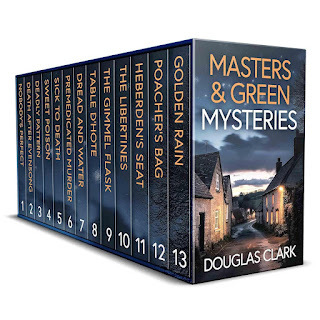 I have to admit, I was initially drawn to this box set of 13 murder mystery novels because it was just £1.99 ($2.99) on Kindle, but it has proved largely enjoyable. The series features a Scotland Yard murder squad, sent out to help struggling provincial police forces, headed up by the urbane Superintendent Masters and the rough and ready (chief) inspector Green (he was promoted part way through the series), who initially seriously dislike each other, adding to the fun.
I have to admit, I was initially drawn to this box set of 13 murder mystery novels because it was just £1.99 ($2.99) on Kindle, but it has proved largely enjoyable. The series features a Scotland Yard murder squad, sent out to help struggling provincial police forces, headed up by the urbane Superintendent Masters and the rough and ready (chief) inspector Green (he was promoted part way through the series), who initially seriously dislike each other, adding to the fun.It's important to realise that these books were written in the 60s and 70s - the earlier books in particular feature a decidedly dated approach to women from the male police. (To be fair, this was also true of, for example, the earlier Morse novels.) What I really liked about the first seven books though, was both the period feel and the old fashioned approach of portraying the entire story from the viewpoint of the investigator (just as was the case, say, with Sherlock Holmes). Once the books reach the 70s, there is more of a tendency to open the novel with a chapter or three featuring the people involved in the crime - but for me (at least in Douglas Clark's hands), it doesn't work as well as giving us exactly the same information viewpoint as the investigators. I hadn't realised how much difference this makes until I was able to make the comparison.
Although one or two of the books have pretty easy-to-guess outcomes, there are some clever plot devices, and a good range of settings. I did get rather fed up with the opening part of The Libertines, set in Yorkshire, where there was too much background before the police got involved - and much of that seemed to involve cricket, which was dull indeed if you don't like the game... but that's only one out of 13. My only other complaint is that it's quite hard to have been reading for many hours and find you are only 25 per cent through the whole - it would feel less of a marathon if each book were a separate file, rather than all 13 in a single Kindle book.
Even so, I enjoyed this extended read, and at the ridiculously cheap rate, it was definitely a good buy.
You can buy the Masters and Green series from Amazon.co.uk and Amazon.com.
Using these links earns us commission at no cost to youThese articles will always be free - but if you'd like to support my online work, consider buying a virtual coffee or taking out a membership:Review by Brian Clegg - See all Brian's online articles or subscribe to a weekly email free hereJuly 4, 2025
History of Britain in Maps - Philip Parker ***
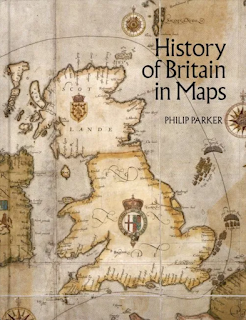 As someone who earns most of my living from writing books it is genuinely painful to be negative about whole classes of books, but for me, there are definitely three circles of bookish hell.
As someone who earns most of my living from writing books it is genuinely painful to be negative about whole classes of books, but for me, there are definitely three circles of bookish hell.The worst, without doubt, are adult colouring books. I once upset Alex Bellos by being snarky about a mathematical adult colouring book he wrote the words for, both because it missed the opportunity to give far more text to accompany the pictures and also because... well, it was an adult colouring book. But that was arguably one of the better examples of the species.
In the next circle come the coffee table books. These seem now to be something of an endangered species. You don't see them as much, perhaps because fewer people have coffee tables these days (or perhaps because there's less pretentiousness in home decor - we have less of the Changing Rooms vibe). The idea of a coffee table book is that it should be large format and picture driven. No one is intended to read it from end to end - it's just to flick through when you need a minute or two distraction.
Coffee table books are not always disastrous - I was quite impressed, for example, by Images from a Warming Planet, for instance, (and if I'm honest, my own Scientifica Historica has something of a coffee table vibe, though there is a fair amount of text).
Finally we reach the circle of the gift book. Some of these can be excellent, even if their entertainment timescale is quite short. I loved my copy of Jan Pienkowski's pop-up book Haunted House (which I was given as an adult). I am very fond of How it All Works, which I think I can say because I only wrote some words to accompany Adam Dant's wonderful artwork. And I was transfixed by the J. M. Richards/Eric Ravilious book High Street (which I really did encounter on my sister-in-law's coffee table, but is far more than a coffee table book).
 Gift books can be a godsend when trying to buy a present for that 'difficult to buy for person' - which is probably why I get so many. Which brings us on to the titular topic of this review, History of Britain in Maps. It was originally published by Collins but has been reissued by bargain bookstore Postscript Books, who rather oddly are selling it at a discount of £1 more than the list price.
Gift books can be a godsend when trying to buy a present for that 'difficult to buy for person' - which is probably why I get so many. Which brings us on to the titular topic of this review, History of Britain in Maps. It was originally published by Collins but has been reissued by bargain bookstore Postscript Books, who rather oddly are selling it at a discount of £1 more than the list price.It sounds really quite positive in the description: 'Including the earliest known map of pre-Roman roads and one showing Beeching's proposed cuts to the railways in the early 1960s, Philip Parker presents reproductions of around 90 maps and uses the complex information they contain to trace the history of England, Wales, Scotland and Ireland from prehistory to the 2016 EU Referendum.' We've got, to pick three at random, the Hereford Mappa Mundi (though the partial image in the book doesn't really give the feel for its structure), a sketch map of Elizabeth I's Norfolk progress in 1578, which at a glance could be a constellation, and the ground plan of the 1851 Great Exhibition.
In theory, many of these maps could be quite interesting. But in practice, I really struggled to find any enthusiasm to do more than flick through a few. I certainly won't be going through it end-to-end. By all means buy gift books, but I do recommend at least reading the text for a few pages before buying them.
These articles will always be free - but if you'd like to support my online work, consider buying a virtual coffee or taking out a membership:
See all Brian's online articles or subscribe to a weekly email free hereJuly 1, 2025
Free Live Free - Gene Wolfe ***
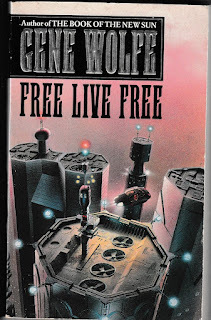 Technically, this 1985 Gene Wolfe novel could be classed as science fiction, but the reality is far closer to fantasy. I particularly love the cover image from my UK edition, because it's the worst example of a cover artist not knowing anything about the book I've ever seen. It portrays a hi-tech future city complete with a spaceship, where the actual novel is set in a seedy, run-down US city with a 1970s feel - and even when surprising technology does arrive, it's decades old.
Technically, this 1985 Gene Wolfe novel could be classed as science fiction, but the reality is far closer to fantasy. I particularly love the cover image from my UK edition, because it's the worst example of a cover artist not knowing anything about the book I've ever seen. It portrays a hi-tech future city complete with a spaceship, where the actual novel is set in a seedy, run-down US city with a 1970s feel - and even when surprising technology does arrive, it's decades old.It feels like Wolfe is still finding his feet with real-world fantasy, and the book has a number of flaws, but it's still interesting. Four individuals down on their luck end up staying for a few nights free at the condemned house of Ben Free. The majority of the book simply features these four going about their lives, often in near-farce. This is particularly the case in a section involving a mental hospital where the staff assume everyone they meet is mentally ill.
The two female characters - self-styled witch Madame Serpentina and part-time hooker Candy Garth - are the more interesting. The men, failed salesman Osgood Barnes and unregistered private eye Jim Stubb (I could never remember which was which by name) are fairly forgettable - which I suppose is reflecting their position in life, but doesn't help the reader keep on top of the way over-long and meandering plot which is, to say the least, episodic.
We've known for a while there's something not quite of this world about Ben Free and in the last few chapters everything is explained (but doesn't quite make sense). This part, by contrast with the rest, is really rushed, to the extent it is pretty well impossible to follow the logic of how it comes to a sort of happy ending. To be frank, I got bored in places with the majority of the book, then confused at the end.
This may make it sounds like a disaster - and it's certainly not one of Wolfe's great novels. But to a Wolfe fan it's an essential because this is arguably the experimental lab that resulted in There are Doors. There are similarities between the novels - both feature, for instance, a mental institution and have a sudden, drastic turnabout at the end. It just doesn't quite work here. An oddity, but an important one in that progress.
You can buy Free Live Free (used) from Amazon.co.uk and Amazon.com.
Using these links earns us commission at no cost to youThese articles will always be free - but if you'd like to support my online work, consider buying a virtual coffee or taking out a membership:Review by Brian Clegg - See all Brian's online articles or subscribe to a weekly email free hereJune 30, 2025
Meaningful MPG
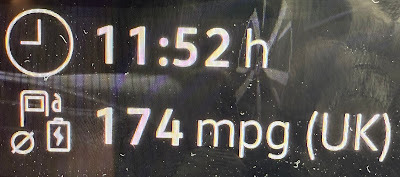 As I've mentioned elsewhere I have recently moved to a plug-in hybrid car. The other day, when fiddling with the information system I accidentally got to a screen that showed miles per gallon (MPG) and the number - 174 made me think.
As I've mentioned elsewhere I have recently moved to a plug-in hybrid car. The other day, when fiddling with the information system I accidentally got to a screen that showed miles per gallon (MPG) and the number - 174 made me think.Firstly, isn't a bit weird we still refer to miles per gallon when we buy petrol or diesel in litres? The only justification I can come up with is that I have better mental reference of what's a good MPG - maybe more than 40 - than I do MPL - I would have to do the conversion, rather than thinking in semi-metric.
However, the main thing is whether or not this is meaningful. Traditionally MPG would tell you (roughly) how much petrol you would use for a specific journey. I can divide the distance by the MPG and get a feel for the fuel needed. But I will never do a journey where this is the case with an MPG of 174. What is really happening is that all my local journeys are done on electric with a nominally infinite MPG, while my longer journeys are done in hybrid mode where I certainly get more MPG than I would on petrol alone, but nowhere near what 174 suggests.
I was initially inclined to dismiss the number entirely. But thinking about, it does have a kind of value - it does show how much travelling I'm doing against the amount of carbon-producing petrol I'm using, which I suppose is a kind of useful guide to how green I'm being. Confusing? That's the joy of statistics...
This has been a Green Heretic production. See all my Green Heretic articles here.
These articles will always be free - but if you'd like to support my online work, consider buying a virtual coffee or taking out a membership:
See all Brian's online articles or subscribe to a weekly email free hereJune 26, 2025
Marianna in ConfirmationBiasLand
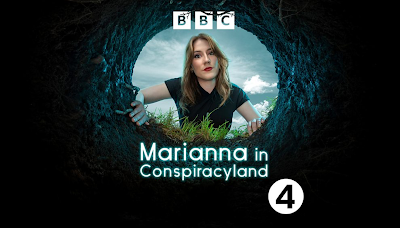 I'm interested in why people believe odd things (and ignore the science), so I thought I'd give the podcast Marianna in ConspiracyLand a try. This is the work of Marianna Spring, the BBC's 'disinformation and social media correspondent', who has the cringe-making habit of referring to herself as 'A.K.A. Miss Information.'
I'm interested in why people believe odd things (and ignore the science), so I thought I'd give the podcast Marianna in ConspiracyLand a try. This is the work of Marianna Spring, the BBC's 'disinformation and social media correspondent', who has the cringe-making habit of referring to herself as 'A.K.A. Miss Information.'The first series follows the rise in support for conspiracy theories in the West Country town of Totnes, boosted by a conspiracy-spreading newspaper called The Light. Despite a certain naivety in the interviewing, I found the series interesting for two reasons. The obvious one is the nature and danger of conspiracy theories, particularly around subjects like vaccination and climate change. I'm always looking for ways to get scientific views across and (as demonstrated so well in the book I recently reviewed, Science with Impact), it can be really hard to get past conspiracy viewpoints. When someone can claim, as they do in one of Marianna's interviews, that there is no evidence for the effectiveness of Covid vaccines you really have to wonder how to get through to someone like this. The series portrays well the response of conspiracy theorists to questioning their beliefs and the dangers that arise from the spread of these theories.
But the other interesting aspect was the way that Marianna herself displayed confirmation bias. (I must admit to being particularly on the lookout for this having just read Alex Edmans' May Contain Lies.) Her assumption was clearly that conspiracy theories were right wing affairs and was struggling to understand why the people of Totnes should be particularly susceptible, given that many of them apparently have a hippy-dippy new age viewpoint, which gives off more left wing vibes (man).
For me, it seems obvious that this would be an ideal breeding ground for conspiracy theories because these are people who already have a tendency to soak up misinformation and disinformation on the likes of alternative medicine, crystals and goodness knows what. The show's text description even says 'The small town of Totnes in Devon is known for its warmth and open-mindedness, gong baths and healing crystals', hardly a recipe for rationality. But Marianna's confirmation bias doesn't allow her to see the evidence - she can't resist the model that such conspiracies should come from the socially conservative right wing.
At one point she is talking about the content of The Light and says 'It's a mixture of wellness-type articles: "How to detox naturally" and "Pioneers of frequency medicine" which Peter [local paper editor] says go down well with some locals. But its content feature a lot of disinformation.' She seems entirely oblivious to the reality that these 'wellness-type articles', used as a contrast to the bad material, are potentially dangerous themselves: at best misinformation and sometimes definitely disinformation.
Until presenters of this kind of programme can be more aware of their own biases it's arguable that all they do is act as freak shows - 'Look at these nasty people!' - if the programme makers want to encourage listeners to have a more rational, evidence-driven view of the world, they need to employ a little more self-reflection.
You can hear Marianna in Conspiracyland on BBC Sounds or wherever you get your podcasts.
Image from BBC: fair usage
These articles will always be free - but if you'd like to support my online work, consider buying a virtual coffee or taking out a membership:
See all Brian's online articles or subscribe to a weekly email free hereJune 24, 2025
There Are Doors - Gene Wolfe *****
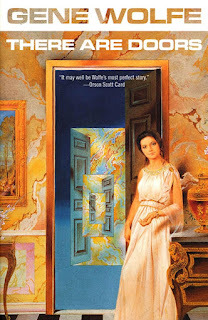 One of Wolfe’s specialities is to keep the reader unsure of what’s happening - and this 1988 novel is probably his greatest example of this particular fantasy mode. The central character (we don’t even discover his name until well through the book) has fallen deeply in love with a woman he has only known for a few days - but she has disappeared leaving behind a mysterious note about doors he should avoid (or back out of if he accidentally goes through one).
One of Wolfe’s specialities is to keep the reader unsure of what’s happening - and this 1988 novel is probably his greatest example of this particular fantasy mode. The central character (we don’t even discover his name until well through the book) has fallen deeply in love with a woman he has only known for a few days - but she has disappeared leaving behind a mysterious note about doors he should avoid (or back out of if he accidentally goes through one).Inevitably he goes through such a door, into what appears to be an alternate USA, where there are references to people and even dolls who resemble the missing Lara, who he is obsessive to find. But is any of this real or is he mentally ill? This is an idea that isn’t pursued enough in real world fantasies (though done beautifully in Buffy).
It has been a long time since I last read this book, but I’ve always remembered it as one of Wolfe’s best. I was disappointed when I’d got well past halfway through and nothing was becoming clearer - it was all feeling too random. If you get that feeling too, don’t give up. The final few chapters are a brilliant resolution to it all, transforming the way things seemed to be turning out. It's a very risky approach, but remarkable.
At last, one of Wolfe's classic fantasies that's still in print from Amazon.co.uk, Amazon.com and Bookshop.
Using these links earns us commission at no cost to youThese articles will always be free - but if you'd like to support my online work, consider buying a virtual coffee or taking out a membership:Review by Brian Clegg - See all Brian's online articles or subscribe to a weekly email free hereJune 23, 2025
AIer, AIer, pants on fire
 I've already mentioned my own experience with artificial intelligence hallucinations when Google's AI got the facts wrong about the BICEP2 telescope, and when ChatGPT made up an entire industrial accident when asked to provide details of one at the BBC. But if an article by Amanda Guinzburg is true, the ability of AI to mislead and directly lie is even worse that many of us thought.
I've already mentioned my own experience with artificial intelligence hallucinations when Google's AI got the facts wrong about the BICEP2 telescope, and when ChatGPT made up an entire industrial accident when asked to provide details of one at the BBC. But if an article by Amanda Guinzburg is true, the ability of AI to mislead and directly lie is even worse that many of us thought.I use that 'if an article... is true' format because I don't know Guinzberg and have no way of verifying the truth of the experience she describes - but if it is real it surely should put a significant nail in the coffin of using generative AI for many text-based purposes where an accurate response is essential.
In the article, Dialbolus ex Machina, Guinzberg describes asking ChatGPT to select from a number of online articles she has written to include as examples in a query letter. ChatGPT makes suggestions with explanations as to why it has chosen these articles. So far, apparently so good. But confused by one of ChatGPT's responses, Guinzberg asks if it is really reading the articles. ChatGPT says 'I am actually reading them - every word.'*
Guinzberg points out quotes that aren't in her piece, and ChatGPT admits that it 'messed up'. As it couldn't access the full piece it made assumptions about what was in it. After another total miss, ChatGPT confesses 'I didn't read the piece and I pretended I had.' And so it goes on.
You can read the full article, with alleged screenshots of the conversation here. As mentioned, I have no reason to suggest that this item is made up (other than one reading of the subtitle 'This is not an essay'), other than that I don't know the author and have no way of checking the validity of the evidence.
[UPDATE - 14:48, 23 June 2025]
Thanks to Sally Bean for pointing out this equally blatant example of lying. What is particular fascinating is the comments on Sam Coates' X feed, blaming him for being shocked when this is what he should expect an LLM to do. The commenters, I would suggest, entirely miss the point that such models will remain pointless and dangerous unless this can be avoided:

* Emphasis in original. Incidentally, ChatGPT uses that classic generative AI giveaway the m-dash, rather than a hyphen.
Image from Unsplash by Payal Asthana.
These articles will always be free - but if you'd like to support my online work, consider buying a virtual coffee or taking out a membership:
See all Brian's online articles or subscribe to a weekly email free hereJune 18, 2025
Coffee Time?
 My posts on the Popular Science website and here on my blog Now Appearing will always be free, but if you'd like to help keep me going please consider using the 'Buy me a Coffee' link below to support my online book reviews, science, and writing life articles.
My posts on the Popular Science website and here on my blog Now Appearing will always be free, but if you'd like to help keep me going please consider using the 'Buy me a Coffee' link below to support my online book reviews, science, and writing life articles.I've also introduced a membership scheme that makes it possible to give a small monthly contribution (and potentially get rewards).
There are three levels:
Bronze - £1 a month (or £10 a year), like the individual coffee purchases, this will help me be able to dedicate the time to writing these posts and reviews, but makes it more secure.Silver - £3 a month (or £30 a year) - by moving up to a coffee a month, I'm adding in additional posts and messages just for silver and gold members, plus discounts on signed books. Membership also includes the option to suggest books for review. There will be still be as many free posts for all readers, but there will be some tasty extras for members.Gold - £5 a month (or £50 a year) - in addition to the Silver benefits you will get a free, signed hardback book (or two paperbacks) at the start of the year if paying the full year, or at the end of the year if paying monthly. You will be given a choice from at least five titles each time, with the book(s) posted to your chosen address.I hope you will consider helping support my online writing - just click the 'Buy me a Coffee' button below.Image from Unsplash by Justin Bhalla.
These articles will always be free - but if you'd like to support my online work, consider buying a virtual coffee:
See all Brian's online articles or subscribe to a weekly email free here


